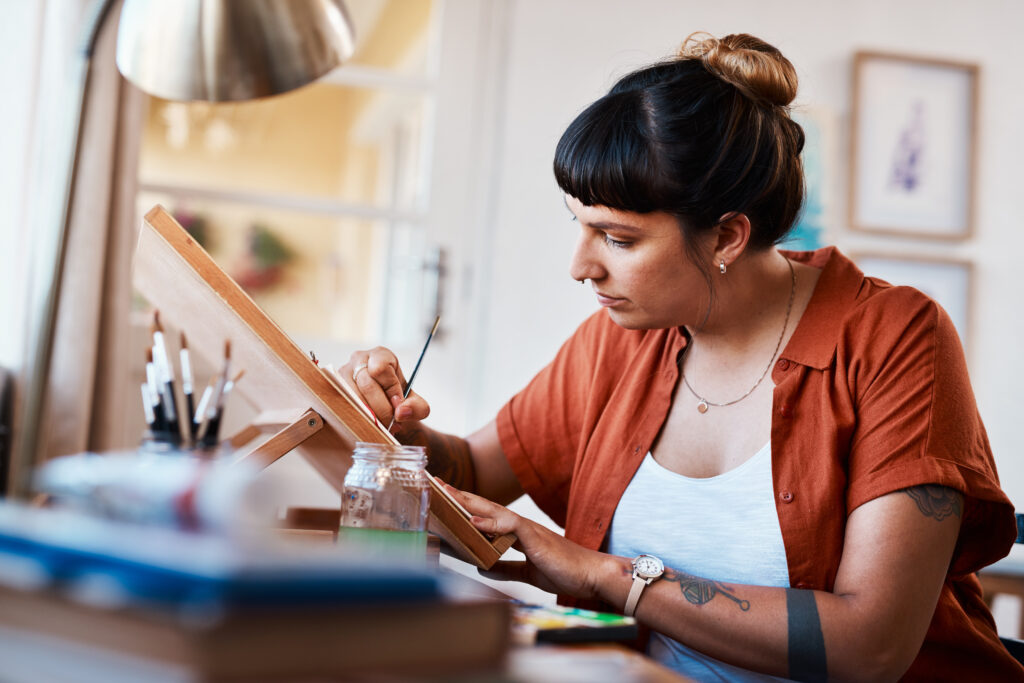Nurturing Your Inner Artist: The Importance of Hobbies for Personal Growth
In the hustle and bustle of our busy lives, it’s easy to forget to take care of ourselves. However, nurturing our inner artists through hobbies and creative pursuits is essential for personal growth and well-being.
Engaging in activities that bring us joy and satisfaction can have a significant impact on our mental, emotional, and even physical health. Whether it’s painting, playing an instrument, or knitting, hobbies can offer a break from daily stressors and provide a space for self-expression.
In this blog post, we’ll explore the role of hobbies in personal growth and discuss some of the benefits of incorporating creative pursuits into our lives. Keep reading!
What Are the Benefits of Having a Hobby?

Many of us lead busy lives, juggling work, family, and social commitments.
It can be challenging to find the time and energy to pursue activities that aren’t strictly necessary for survival. However, taking up a hobby can have significant benefits for our personal growth and well-being.
Firstly, hobbies allow us to decompress and unwind from the stresses of daily life. Engaging in an activity we enjoy can be a form of mindfulness, helping us focus on the present moment and let go of worries about the past or future.
In addition, hobbies can help us build skills and expertise in a particular area. Whether it’s gardening, painting, or playing an instrument, mastering a new skill can be incredibly satisfying and boost our confidence and self-esteem.
Hobbies can also provide opportunities for social interaction and connection. Joining a club or group focused on a shared interest can help us meet new people and expand our social networks. This can be particularly beneficial for individuals who struggle with social anxiety or feelings of loneliness.
Overall, having a hobby can improve our quality of life and contribute to our personal growth. It’s worth making time for activities we enjoy, even if they may not seem essential in the grand scheme of things. In the next section, we’ll explore how hobbies can help us connect with ourselves on a deeper level.
How Do Hobbies Help Us Connect with Ourselves?

Hobbies have the potential to provide a deep connection to oneself.
Engaging in a hobby creates an environment where we can fully immerse ourselves in something we love. It is a time where we can tune out the noise of the outside world and focus solely on our passion. This focused time allows us to slow down and connect with our thoughts and emotions in a unique way.
Having a hobby can also bring a sense of purpose and meaning to our lives. When we engage in a hobby that we are passionate about, it can provide a sense of accomplishment and pride. This is because we are actively creating and expressing ourselves through our chosen hobby. It allows us to showcase our skills and creativity in a way that may not be possible in our professional or personal lives.
In addition to the creative benefits, hobbies can also help us connect with our physical and emotional selves. Activities like hiking, running, or yoga can bring a sense of calm and grounding to our lives. These activities allow us to connect with our physical body and feel the sensations of being alive.
Overall, hobbies provide us with an opportunity to fully connect with ourselves in a way that is unique to each individual. Whether it’s through creating art, cooking, or practicing meditation, engaging in a hobby has the power to enhance personal growth and well-being.
So, don’t hesitate to take up that new hobby that’s been on your mind. You never know how it may positively impact your life!
What Kinds of Hobbies Can Help Us Grow?

There are many different types of hobbies that can help us grow and improve ourselves in different ways.
Here are just a few examples:
- Creative hobbies. Pursuing a creative hobby like painting, drawing, or writing can help us tap into our inner artist and express ourselves in new and meaningful ways. Creative hobbies also encourage us to think outside the box, take risks, and develop our problem-solving skills.
- Physical hobbies. Engaging in physical hobbies like hiking, yoga, or dancing can help us improve our physical fitness, release stress, and boost our mood. Physical hobbies also challenge us to push ourselves beyond our limits, develop discipline and perseverance, and cultivate a deeper sense of self-awareness.
- Learning hobbies. Engaging in hobbies that involve learning and intellectual growth, such as reading, studying a new language, or taking a course in a new subject, can help us expand our knowledge and understanding of the world around us. Learning hobbies also help us develop critical thinking skills, improve our memory and cognitive function, and boost our confidence and self-esteem.
- Social hobbies. Pursuing hobbies that involve interacting with others, such as team sports, group classes, or volunteering, can help us develop social skills, build meaningful connections with others, and improve our emotional intelligence. Social hobbies also challenge us to communicate effectively, work collaboratively, and practice empathy and compassion.
No matter what kind of hobby you choose to pursue, the key is to find something that you enjoy and that challenges you in a positive way. With the right hobby, you can nourish your mind, body, and soul, and grow into the best version of yourself.
How Do We Get Started?

If you don’t already have a hobby or creative pursuit in your life, getting started can feel daunting.
Here are a few tips to help you take that first step:
- Explore your interests. What have you always been curious about? What activities make you lose track of time? Start with a list of things that interest you and do some research to find out more about each one. You might be surprised at what catches your attention!
- Try something new. Don’t be afraid to step outside of your comfort zone and try something you’ve never done before. It might be challenging at first, but it can also be incredibly rewarding.
- Start small. You don’t have to commit to a huge project or spend a lot of money to start a new hobby. Try taking a short class or workshop to get a taste of something new, or start with a simple project that you can do at home.
- Make time for it. One of the biggest challenges of starting a new hobby is finding the time to do it. Try to set aside a specific time each week for your new pursuit, even if it’s just for a few minutes. As you start to see the benefits, you may find yourself wanting to devote more time to it.
Remember, the goal of a hobby is not to become a professional or to impress anyone else. It’s about connecting with yourself, learning something new, and finding joy in the process. So don’t worry about being perfect or getting it right the first time – just have fun and enjoy the journey!
Ready to sell your property? Give us a call today and learn more about our professional photography services and marketing that can boost your property listing!
Plus, explore our virtual assistant coaching program to level up your business. Don’t forget to tune into our new podcast for even more valuable insights!
